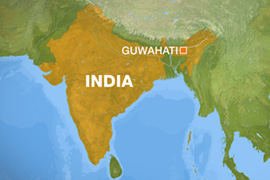India makes Assam blast arrests
Investigators detain a dozen people as toll from serial bombings rises to 76.

A senior official, who did not want to be identified, claimed on Friday that investigators were making progress with the investigation.
“We should be able to zero in on the people or groups involved in the serial bombings,” he said.
Needle of suspicion
Speaking in the immediate aftermath of the blasts, Himanta Biswa Sarma, a government spokesman, said “the needle of suspicion” pointed to the Ulfa, an Assamese separatist group.
Ulfa, however, denies it had any involvement in the bombings.
Police said a previously unknown Muslim group claimed responsibility on Friday in a text message to Newslive, a television network in Assam.
 |
The group, identifying itself as the Islamic Security Force-Indian Mujahedeen, said such attacks would continue in Assam, police said.
“The Islamic Security Force-Indian Mujahedeen takes the responsibility for yesterday’s blasts,” the text message is reported to have said.
“We warn all of Assam and India for situations like this in the future and we thank all our holy members and partners.”
Police have been investigating whether Muslim groups active in the region, including the Bangladesh-based Harkat-ul-Jihad-al-Islami, could have masterminded the attacks.
Many armed separatist groups are active in India’s northeast, which is wedged between Bangladesh, Bhutan, China and Myanmar, with only a thin corridor connecting it to the rest of India.
Earlier this month, at least two people were killed and 100 injured in four bomb blasts in Assam that the police blamed on Muslim groups based in Bangladesh.
Multiple groups
Matt McClure, Al Jazeera’s correspondent reporting from Guwahati, said investigators were exploring the possibility that different groups joined forces to co-ordinate attacks on such a large scale.
He also reported that curfews had been imposed in some parts of the city following outbreaks of violence in the wake of the attacks.
“The situation is very tense,” McClure said.
“People are very angry nothing was done to prevent these attacks.”
Preliminary investigations showed some of the bombs had been strapped to motorcycles and bicycles and packed with incendiary materials designed to trigger fires and maximise damage.
“Most of the bombs were planted in crowded places like markets and office complexes … so it shows that the perpetrators wanted high casualties,” Sarma, the government spokesman, said.
Preliminary stage
Bhaskar Jyoti Mahanta, Assam’s inspector-general of police, cautioned that the investigation was “at a very preliminary stage”.
Nevertheless, he said “we have reason to believe that the militants used PE-3 explosives, a highly plasticised, RDX-based explosive”.
Guwahati took the brunt of the attacks, with one bomb exploding just 100 metres from the official residence of Tarun Gogoi, the state chief minister.
More bombs exploded in Barpeta, Kokrajhar, Bongaigaon and Tinsukia districts.
Manmohan Singh, the Indian prime minister, who is expected to visit the region on Friday, vowed every effort would be made to bring the bombers to justice.